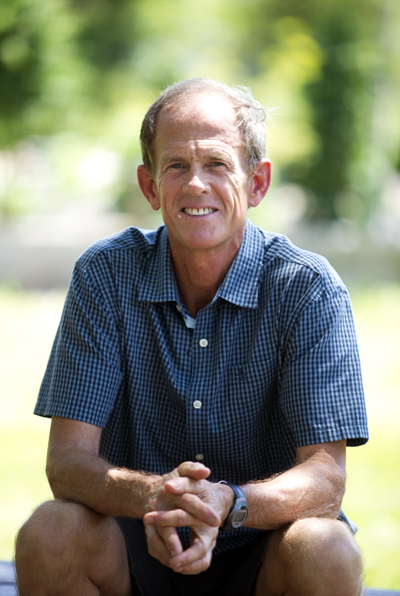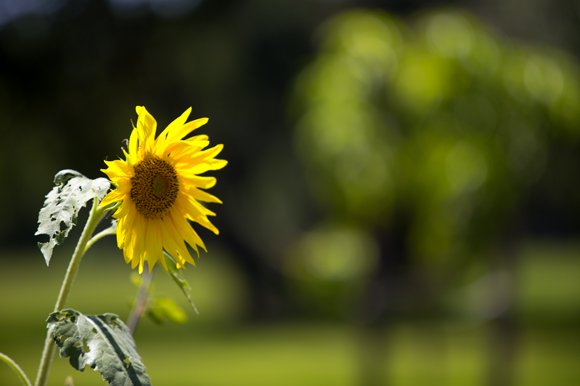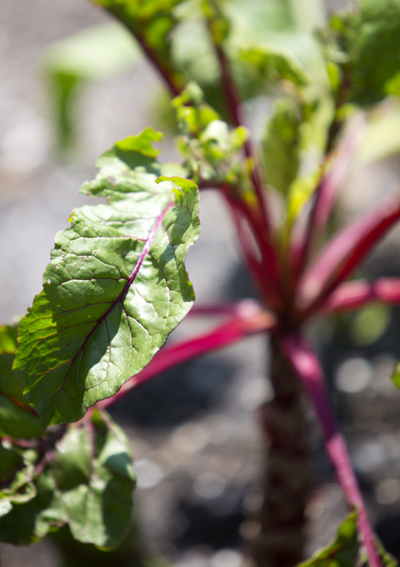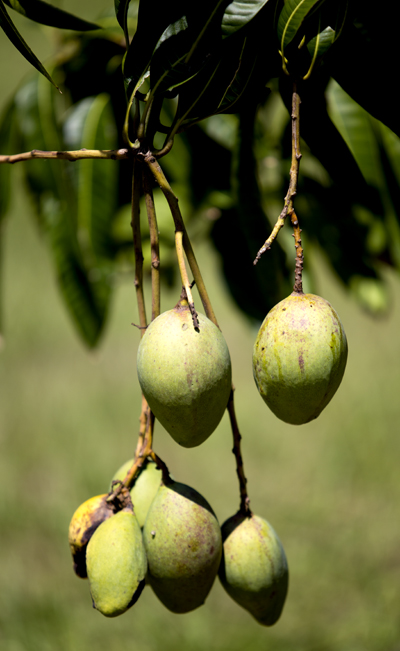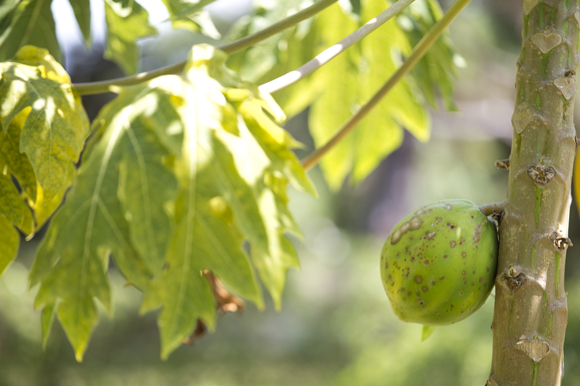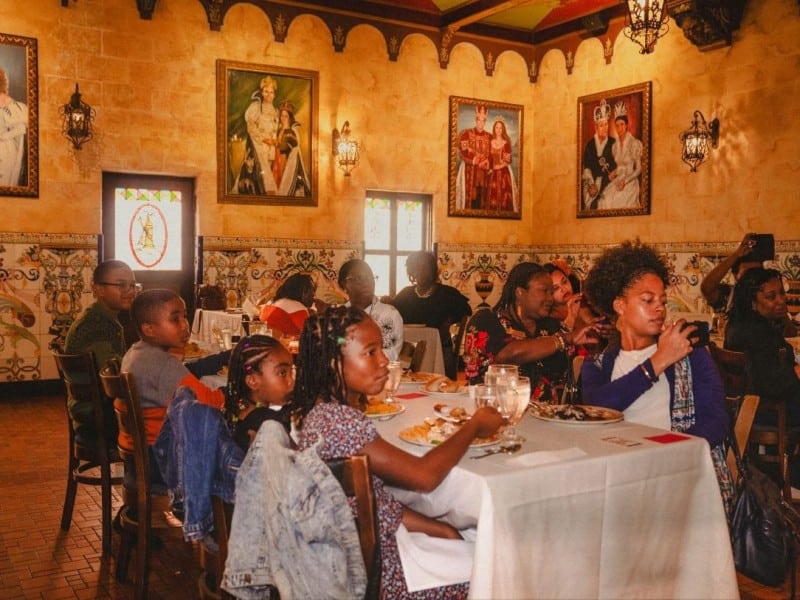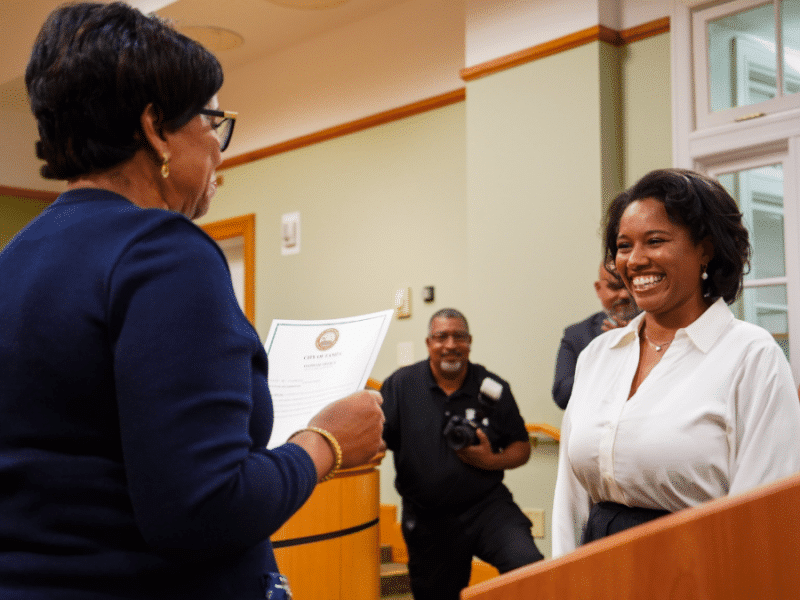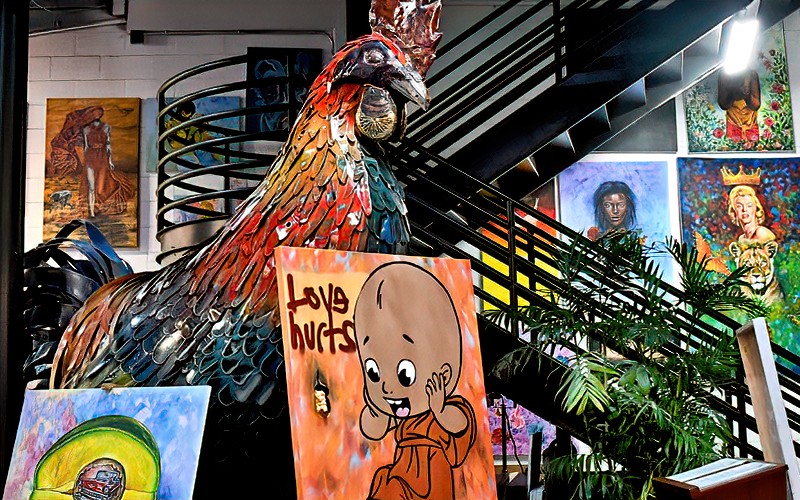How does your garden grow? St. Petersburg students learn hands-on about fresh food
The Edible Peace Patch Project, originally the vision of an Eckerd College professor, has now expanded to seven schools in South St. Petersburg, with a small army of volunteers helping teach kids about gardening and more.
The students at Campbell Park Elementary School were inside winding up the school year in the classroom. Outside, volunteers for Edible Peace Patch were working up a sweat at the school’s four colorful garden boxes.
Ray Wunderlich, Peace Patch Garden Manager, was directing volunteers to mix coffee grounds from Kahwa Coffee and tea bags from TeBella Tea Company with food waste from local restaurants, plus remnants of green beans, broccoli, collard greens and other vegetables gone to seed.
“We’re adding nutrients and preparing the soil, then the boxes will be covered over for the summer to get them ready for the next school year in the fall,” says Wunderlich.
Zoey, the little poodle chihuahua, watched the process intently from her safe perch inside a big side pouch slung over Kelli Harper’s shoulder.
“Zoey loves coming to the gardens, especially when the kids are out here,” says Harper, who is the Edible Peace Patch education and volunteer coordinator.
Seven school garden projects
The Edible Peace Patch first launched in 2009, the brainchild of Eckerd College Professor Kip Curtis who taught environmental studies. With the help of his students, he launched the first garden at Lakewood Elementary School. Over the years, additional schools were added.
Now, in addition to Lakewood Elementary School, there are gardens at Melrose, Fairmont, Maximo and Campbell Park Elementary Schools, as well as Sanderlin IB Pre-K through 8th grade World School, and Johns Hopkins Middle School in Pinellas County Schools.
All are Title I schools, in keeping with the Edible Peace Patch mission of cultivating healthy minds and bodies in hands-on educational gardens in low-income areas of St. Petersburg.
The teachers, students and volunteers involved in the project love it.
Yansel Ginesta, who lives in Tampa, was there on his day off from his job at Capital One. “It’s a great project and should be part of every school. Everyone should know where their food comes from and how to grow it,” says Ginesta.
Sharmain Lightheart, who relocated to Tampa Bay from Australia with her husband, has been a weekly volunteer since September 2015. Gardening and permaculture are big in Australia, she says, and volunteering with the Peace Patch Project gives her not only a chance to be out in nature, but contributes something back to the local community.
Alliyah Edwards, a St. Petersburg College graduate who will be going to the University of South Florida St. Petersburg (USFSP) in the fall, is also a regular volunteer.
“I got started as a volunteer originally as part of a service-learning project,” says Edwards. “It’s very rewarding and so cute to see how excited the kids are to come out here.”
Daisy Harris, a second-grade student at Melrose Elementary, would certainly agree. “Peace Patch is fun because we get to grow plants,” says Harris. “The volunteers are great because they teach us things and let us eat from the garden.”
Hands-on learning
Learning how to eat healthy and understanding where food comes from is a big focus for the garden project. But there’s also a strong academic focus.
“We collaborate with the Pinellas County School District to bring a 10-week garden education program to students in the fall and spring,” says Harper, the Peace Patch education and volunteer coordinator.
Harper coordinates with the local schools and teachers and trains volunteers. Volunteers not only pull weeds and plant seeds, but assist Harper in teaching students weekly lessons.
“It’s an inquiry-based, very hands-on learning,” says Harper. “We’re teaching math and science in the garden. The garden is our outdoor classroom.”
Kip Curtis and his Eckerd College students developed the initial curriculum, which has been fine-tuned over the years, says Harper. It has also been supplemented with materials from the Florida Department of Agriculture’s Florida Farm to School Program.
Big undertakings, big rewards
Kristi Hatakka is a Florida Farm to School State Garden Specialist with the Florida Department of Agriculture and Consumer Services.
She travels around Florida visiting school gardens and just happened to stop by Campbell Park the day that Wunderlich, Harper and volunteers were busy getting the boxes ready for the summer hiatus.
“The Peace Patch has been on my radar to visit for some time,” says Hatakka. “I’ve heard good things about it.
“School gardens are big undertakings,” says Hatakka. “Many nonprofits, like Peace Patch, are helping teachers sustain this type of endeavor, which is so valuable for students. A garden-based education can impact every step of the educational process, including core STEM classes.”
Hatakka estimates there about 1,300 school gardens in the state – at least those that the Florida Farm to School program is aware of, she says.
Natasha Furse, a second-grade teacher at Melrose says the Peace Patch garden has been a wonderful experience for her class.
“The students have the opportunity to engage in enrichment opportunities that are directly connected to the Common Core standards,” says Furse. “The lessons are engaging and interactive. I am so thankful for the volunteers who have come out to provide students with this opportunity.”
What’s next?
The Peace Patch team would like to see the garden program expand, and has been talking with the Pinellas County School District about the potential to take the concept to other Title 1 schools, in particular Lealman Elementary or Gulfport Elementary Schools, says Wunderlich.
But before that can happen the idea needs to be discussed and then put to a vote by the full Pinellas County School Board, says Renee Flowers, a Pinellas County School Board member.
“Peace Patch is a really good idea and a well-structured program,” says Flowers. “It incorporates science, math, teamwork, unity, camaraderie and responsibility. It’s also fun for the students and something that they can take home. But there’s still a lot of details to work out, including the increasing demand on the school day.”
The program is also limited by funding, which comes from a variety of sources, including private donations and grants from organizations such as Whole Foods and the Tampa Bay Rays.
At the end of May, a sold-out crowd attended a Peace Patch fundraiser honoring Watson Haynes, CEO of the Pinellas County Urban League, for his support of the garden program.
To learn more about how Edible Peace Patch impacts students, visit the program’s Facebook page, where you’ll find videos of students from various schools proudly tending their gardens.

